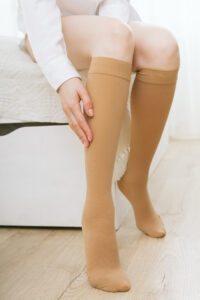Is there any natural treatment for varicose veins?
 If you’re seeking treatment for varicose veins, you may be reluctant to undergo surgery. In the past, varicose vein treatment was complicated and involved a hospital stay and lengthy recovery. The idea of going through something like that may have you seeking natural varicose vein treatment. It’s important to note, though, that varicose veins treatments have come a long way, and most are minimally invasive. Still, if you want to know how to get rid of varicose veins naturally, we have some suggestions that may be worth a try.
If you’re seeking treatment for varicose veins, you may be reluctant to undergo surgery. In the past, varicose vein treatment was complicated and involved a hospital stay and lengthy recovery. The idea of going through something like that may have you seeking natural varicose vein treatment. It’s important to note, though, that varicose veins treatments have come a long way, and most are minimally invasive. Still, if you want to know how to get rid of varicose veins naturally, we have some suggestions that may be worth a try.
To understand how to treat varicose veins, it’s important to know what they are. Varicose is a word that has a Latin root, “varix,” which means twisted. These unsightly, large, bluish-purple, twisted veins are cause by weak valves that allow blood to flow backwards and pool. Blood pooling in the veins causes them to enlarge, and that’s what causes aching, swelling, and itching in your legs. So far, there’s not much scientific proof that any natural varicose veins treatment is effective, but there is anecdotal evidence indicating that these remedies can bring relief in some cases.
- Some people swear by herbal supplements. Horse chestnut extract has been shown to significantly reduce leg pain and swelling, and has potential as a treatment. However, whole horse chestnuts are considered unsafe by the FDA, and tea, leaves, nuts, and other forms of the horse chestnut plant should be avoided. Grape seed and pine bark extracts may help reduce inflammation and strengthen blood vessels, but these extracts are not safe for people with autoimmune conditions and should not be combined with medications unless a doctor signs off. They’re also not proven to be safe for pregnant or nursing women or children. Butcher’s broom is another plant that shows promise for strengthening blood vessels and improving circulation, but it should not be taken with medication for high blood pressure, prostate issues, or with MAO inhibitors, and its safety for children and pregnant or nursing women has not been established.
- There are less risky dietary options for healthier veins. Decreasing your intake of salty food and eating plenty of potassium-rich foods can help. Eating an adequate amount of fiber can alleviate constipation, which can worsen varicose veins.
- Compression socks can be very effective in relieving varicose veins. These specialty socks work by pushing blood towards your heart, relieving the pressure in your legs. If you want to try compression socks, choose some that come up to your knees, and put them on in the morning, while you’re still lying in bed.
- Keep your legs elevated as much as possible. When you elevate your legs, it helps to redirect blood flow to the heart, especially if the legs are at or above heart level. This simply requires propping your legs up on pillows when you’re sitting or lying down.
- Reflexology may reduce leg swelling. Reflexology is a therapy that focuses on the feet, and has been shown to be helpful for those with varicose veins. If you’re pregnant, though, you’ll need to talk to your doctor before trying it.
- A healthy lifestyle can help support healthy veins. Exercise keeps blood circulating and reduces inflammation, and maintaining a healthy weight reduces your risk of developing varicose veins.
If you’re seeking the varicose veins treatment or treatment for other venous issues, trust the board-certified physicians at the Arizona Vein & Laser Institute. Using the most advanced technology, the vascular and cardiovascular surgeons at the Arizona Vein & Laser Institute provide care for all types of venous diseases. With over 40 years of experience, our team of experienced physicians can devise the right treatment plan to address your venous disease problems. For more information contact us through our website.
